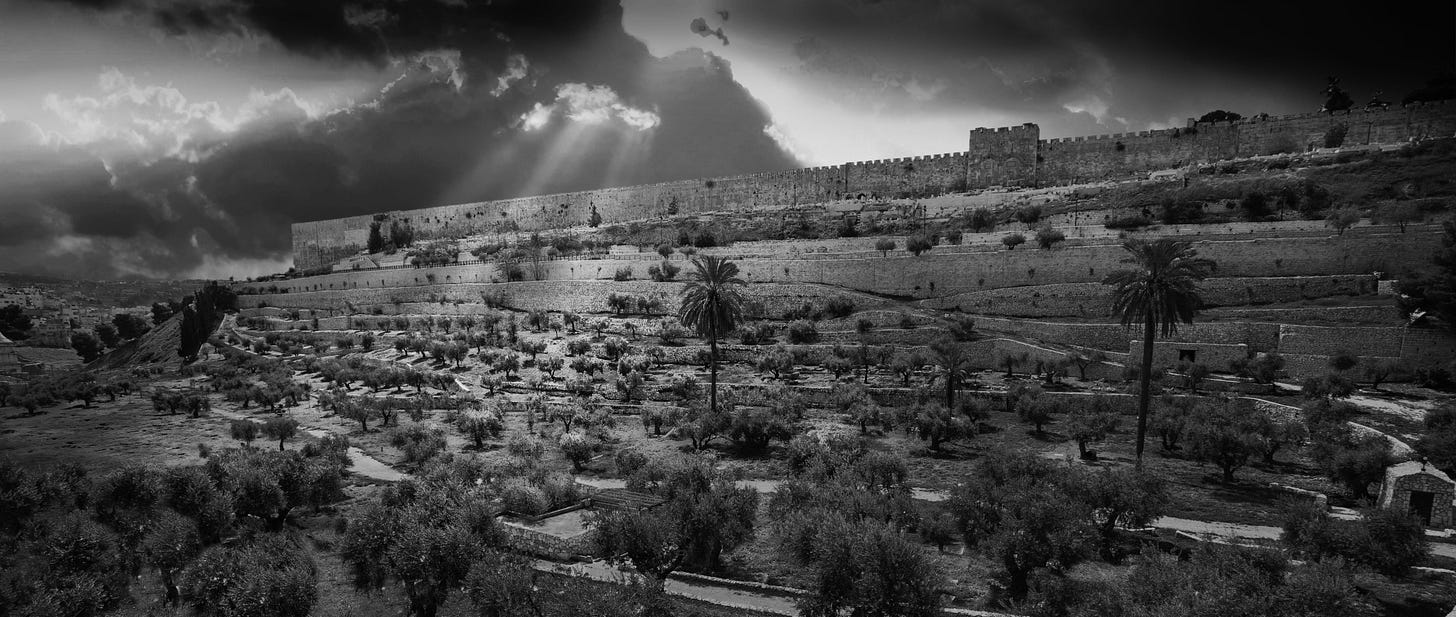This week following the Second Sunday in Advent, I share a message I completed today after studying the Epistle Reading for Sunday (from the 1928 Book of Common Prayer): Romans 15:1-7. I have retained the form I used to prepare manuscripts for over thirty years. In this way, I find the rhythm of worship among the People of God, the context that has shaped my preaching for a lifetime. I re-create that in my mind as I write. Sometimes I get close. Many times, not so much. I tried preaching this without notes (my ordinary method is to prepare a manuscript and preach without notes or with minimal suggestive notes). But it is getting harder. I sincerely appreciate those who pray for me—beyond words. Of course, the Lord doesn’t need me to preach. He has many others (and I pray for more). But until He takes me home, I trust I can announce the Good News of His Kingdom in Christ Jesus our Lord. Okay. ‘Nuff said. Here is the Bible message for this week.
This is the day the Lord has made. Let us rejoice and be glad in it (Psalm 118:24). Give attention to the inerrant and infallible Word of the Living God from Romans 15:1-7.
Scripture Reading:
"We who are strong have an obligation to bear with the failings of the weak, and not to please ourselves. Let each of us please his neighbor for his good, to build him up. For Christ did not please himself, but as it is written, 'The reproaches of those who reproached you fell on me.' For whatever was written in former days was written for our instruction, that through endurance and through the encouragement of the Scriptures we might have hope. May the God of endurance and encouragement grant you to live in such harmony with one another, in accord with Christ Jesus, that together you may with one voice glorify the God and Father of our Lord Jesus Christ. Therefore, welcome one another as Christ has welcomed you, for the glory of God” (Romans 15:1-7 ESV).
Prayer for Illumination:
"The grass withers, the flowers fade, but the Word of the Lord will endure forever (Isaiah 40:8)." Let us pray.
"Lord, let the words of my mouth and the meditations of our hearts be always acceptable in Thy sight, O Lord our Rock and our Redeemer (Psalm 19:14). And let me preach as if I were never to preach again, as a dying man to dying men. Through Christ our Lord, who lives and reigns with Thee, O Father, and the Holy Spirit. Amen."
Introduction:
Ethics without transcendence are like rules without meaning. This principle is vividly illustrated in Romans 15:1-7, where the Apostle Paul calls believers to live in harmony through Christ-centered love and sacrifice. Without this divine foundation, ethics become hollow and disconnected from their ultimate purpose—to glorify God and serve others in alignment with His will. I first encountered this stark reality during my service at the Pentagon. Tasked with revising Army doctrine, I realized that many values—courage, loyalty, self-sacrifice—were being stripped of any transcendent grounding. A soldier returning from Iraq voiced a similar concern: "Chaplain, the enemy shows loyalty and courage, but no one tells me about good and evil." I have observed this same lack of ethical grounding in secular initiatives like “diversity, equity, and inclusion” (DEI) programs: Diversity for diversity’s sake. Equity as a social justice unhinged from biblical justice. Inclusion of all but Christians and Jews. “So How Should We Then Live?” asked Francis Schaeffer in his classic 1976 film. God is not silent. Romans 15:1- 7 offers a divinely revealed ethic for living together in the Kingdom of Christ—the Advent community of the "Once and Future," the "Already and Not Yet."
"Ethics without transcendence are like rules without meaning. — Michael A. Milton
Harmony in the Advent Community:
In Romans 15:1-7, the Apostle Paul writes to the believers in Rome, urging them to live together in harmony by reflecting how Christ relates to them. This passage underscores God’s expectations for a community built on love, patience, and mutual support. "We who are strong have an obligation to bear with the failings of the weak, and not to please ourselves" (Romans 15:1). Here, Paul calls for sacrificial living, mirroring Christ’s selflessness. You can imagine the diversity of people and groups that gathered in the capital of the mighty Roman Empire (27 BC-AD 476)! On top of ethnic plurality, there were significant religious backgrounds, from rabbinical Judaism to Norse and Germanic pagan practices of Northern tribes employed as mercenaries in the Roman military and navy to Greek and Roman mythology (and maybe even Britons and other Celts with their ancient Druid system of sorcery). The Illyrians and Gauls, the Romans, and the Jews would, at their conversion, relate as one under the shadow of the cross, the grace of God in Christ Jesus.
Living in harmony requires a mutual experience of God's grace in Christ. Harmony is not merely the absence of conflict but the active pursuit of unity and peace. If such harmony is conceived in grace, it is also cultivated in grace. Grace must not be merely a theological term but a practical reality—a graciousness. We cultivate such harmony in daily practices of forgiveness, encouragement, and mutual submission, as outlined in Ephesians 4:2-3: "With all humility and gentleness, with patience, bearing with one another in love, eager to maintain the unity of the Spirit in the bond of peace." Paul’s exhortation connects to Jesus’ teaching in Matthew 5:9: "Blessed are the peacemakers, for they shall be called sons of God." This harmony serves as a testimony to the world of the transforming power of Christ. Therefore, Romans 15:1- 7 calls us to a new way of living—living in harmony with each other—through Christ's love and grace, the ethics of the Kingdom of God. So, after reading Paul's admonitions, we might ask, "What are those standards of Kingdom ethics?" We are given at least four essential ethical standards in this part of God's Word.
Harmony is not merely the absence of conflict but the active pursuit of unity and peace. If such harmony is conceived in grace, it is also cultivated in grace.—Michael A. Milton
I. Christian Ethics are Marked by the Standard of Christlike Unity.
The first ethical standard of the Kingdom of Christ is Christ-centered unity out of diversity, which stands in stark contrast to the world’s notions of diversity. Unlike secular approaches that often emphasize division or identity politics, this unity is rooted in the reconciling work of Christ, bringing together people of all backgrounds under one Lord. It transforms diversity into a harmonious testimony of God's kingdom, where differences reflect His creative power rather than separate us. Paul calls for harmony among believers, likening the church to a choir where diverse voices sing in unison under the direction of the Holy Spirit. This reflects Christ’s work bringing together Gentile and Jew, making them one in Him. As Paul writes, "that together you may with one voice glorify the God and Father of our Lord Jesus Christ" (Romans 15:6). This unity echoes the unity of believers described elsewhere: "For in one Spirit we were all baptized into one body—Jews or Greeks, slaves or free—and all were made to drink of one Spirit" (1 Corinthians 12:13). Such unity glorifies God and proclaims the gospel.
This unity extends to every area of life, a unity in Christ.
II. Christian Ethics are Marked by the Standard of Selfless Sacrifice.
The second ethical standard is Christ-centered selflessness. Paul exhorts believers to "please his neighbor for his good, to build him up" (Romans 15:2). This Christlike selflessness is grounded in Jesus’ sacrifice: "The reproaches of those who reproached you fell on me" (Romans 15:3). Consider Philippians 2:3-4, where Paul writes, "Do nothing from selfish ambition or conceit, but in humility count others more significant than yourselves. Let each of you look not only to his own interests, but also to the interests of others." Such sacrificial love reflects Christ’s humility and His willingness to bear the burdens of others.
Having served in the uniform of the US Armed Forces for most of my life, I have witnessed courage firsthand. I have prayed with those who gave all in the dark clouds of combat and their families after they paid the ultimate price. Sometimes, those prayers came even after they returned home, burdened with pain in their very souls. This pain often stemmed from acts of selflessness that cost them dearly—sleep, relationships, and, in some cases, their very lives. Yes, I have known such heroes. Heroes have one defining characteristic: they give themselves for others. This self-sacrificial spirit is the essence of genuine leadership—it unites true leaders and inspires others to follow.
Selflessness demands practical expressions of love. It means bearing one another’s burdens (Galatians 6:2) and forgiving as Christ forgave us (Ephesians 4:32). This selflessness builds trust and deepens relationships, creating a community marked by genuine care.
III. Christian Ethics are Marked by the Standard of Redemptive Hospitality.
The third ethical standard is Christ-centered hospitality. Paul writes, "Welcome one another as Christ has welcomed you, for the glory of God" (Romans 15:7). This welcome extends to those who are different or undeserving, echoing the gospel’s invitation. "While we were still sinners, Christ died for us" (Romans 5:8). Jesus’ ministry exemplified such hospitality, as He welcomed tax collectors, sinners, and the marginalized (Luke 19:10; Matthew 9:10-13). The church is called to reflect this radical grace, creating a community that mirrors God’s love for the loveless, His welcome to the prodigal, and His embrace of the most hardened.
Hospitality challenges us to look beyond convenience. Genuine hospitality is costly; it requires time, effort, and vulnerability. It is easier to say, "I want to save the world," than to help someone across the street or, perhaps, much more trying, across the living room. Consider the example of the Good Samaritan (Luke 10:33-35) in Luke 10:33-35. Despite cultural differences and personal risk, the Samaritan stopped to help a wounded man, providing care and covering expenses. Yet, the scripture in Romans 15 calls us to welcome each other into the Body of Christ, which is supposedly much easier. But is it? Or do lingering prejudices or even resentment impede the New Life of the Kingdom?
There is a fourth and final essential standard for becoming one out of many.
It is easier to say, "I want to save the world," than to help someone across the street or, perhaps, much more trying, across the living room. — Michael A. Milton
IV. Christian Ethics are Defined by Scriptural Guidance.
Paul reminds the Romans that Scripture is a source of Christ-centered teaching leading to hope and endurance: "For whatever was written in former days was written for our instruction, that through endurance and through the encouragement of the Scriptures we might have hope" (Romans 15:4). This affirmation is echoed in Psalm 119:105: "Your word is a lamp to my feet and a light to my path." The Word of God strengthens believers to live out these ethical standards.
I have read that Susanna Wesley (1669-1742), the saintly mother of John Wesley (1703-1791) and Charles Wesley (1707-1788)—and seventeen other children (nine died in infancy)— would pull up her hoop skirt over her head, wherever she was in the house, creating an instant and most suitable prayer room and read Scripture, memorize it, and pray it back to God. No doubt Mrs. Wesley needed encouragement and even hope with that large brood! Indeed, encouragement flows from the promises of Scripture. "The Lord is my shepherd; I shall not want" (Psalm 23:1) provides reassurance in times of uncertainty. "I can do all things through him who strengthens me" (Philippians 4:13) emboldens us to face challenges. Such encouragement fuels our commitment to live as Christ’s disciples.
Closing Thoughts:
Like the believers in Rome in Paul's day, we are called to a life of harmony with others. How? We have learned that Paul’s teaching in Romans 15:1-7 reveals an ethic of love grounded in unity, selflessness, and hospitality, guided by Scripture. These standards are not abstract ideals but practical realities empowered by the Holy Spirit. Consider the disillusioned soldier who found meaning in understanding that he was standing for good and against evil—for his family, his country, and the truths of Western civilization. This recognition is a poignant reflection of the Advent message: the coming of Christ brings light into darkness, providing hope and purpose in even the most challenging circumstances. When viewed through the lens of Advent, the soldier's mission mirrors the greater mission of Christ’s incarnation—to confront evil, redeem the lost, and establish a Kingdom of righteousness and peace. Ethics are no longer arbitrary in Christ’s transformative coming but anchored in divine truth. Advent has changed ethics, bringing a Kingdom with an ethic of love that is literally out of this world.
A Charge to Reflect and Act:
How does Christ change how you see the world? See yourself? See others? This Scriptural passage is God's call to live out of the centering point of the cross, our new life born of Christ's love, welcome others as He welcomed us, and glorify God through our unity and sacrificial service. "Let your light shine before others, so that they may see your good works and give glory to your Father who is in heaven" (Matthew 5:16). Here, then, is our God-given ethic—our holy standard—for living with each other in this sacred time between Christ's first coming and His Second: As you have received so give.
In the name of the Father, the Son, and the Holy Spirit. Amen.
A Hymn
I do love the hymn, “The King of Love My Shepherd Is,” to the tune called Saint Columba (the evangelist who brought the Gospel to the Isle of Iona in Scotland). The setting is the Twenty-third Psalm, well-loved and often memorized by children in Sunday School or at home. The hymn (a hymn is that genre of sacred music in which a plurality of voices becomes one as opposed to a solo in which a song written for one is sung by many individuals at once, often without musical and lyrical unity) is beautiful in its serene majesty and Scriptural messaging. Yet, it is even more, for the hymn describes a kingdom, a kingdom of love. The subjects of this Kingdom are called into the Realm and supported and protected by the Shepherd-King. The King of Love My Shepherd Is may not be an Advent hymn per se, but it is appropriate for the Scripture before me on this Second Sunday in Advent. In the 1928 Book of Common Prayer before me, I am looking at the Epistle Reading for this Sunday. A Bible message follows, beginning with a summary, and the hymn follows. May you know the joy and hope of life in the Kingdom of Christ, whose uncontested and divine regent is, indeed, The King of Love Love.The Hymn “The King of Love My Shepherd Is”
“May the God of endurance and encouragement grant you to live in such harmony with one another, in accord with Christ Jesus, that together you may with one voice glorify the God and Father of our Lord Jesus Christ” (Romans 15:5, 6 ESV).
You may listen or read a Blinklist review and summary of this message. It might be helpful. I have no part in the editorial process at Blinklist.







